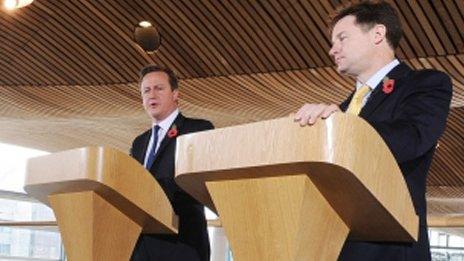Opposition leaders criticise tax power restrictions
- Published

The Scottish government's income tax powers are constrained in the same way
Restrictions on income tax powers offered to the Welsh government have been criticised by all three opposition leaders in the assembly.
UK ministers insist changes to one rate must be mirrored by changes to others.
Andrew RT Davies, Leanne Wood and Kirsty Williams said Welsh ministers should be allowed more flexibility.
They were giving evidence to the Welsh affairs committee on UK government plans to give Wales some control of income tax, after a referendum.
The restriction on changes to income tax rates is known as the "lockstep" rule.
Welsh Conservative leader Andrew RT Davies told MPs on the committee: "I haven't heard an argument other than Scotland have the lockstep so Wales should have it, that would convince me that the lockstep is a sensible course of action to restrain or restrict any future Welsh government from being able to use these powers imaginatively, but I remain to be convinced."
Mr Davies wants to be able to cut the 40% rate of tax, which he said could ultimately bring in more cash, but under the draft Wales Bill he could not cut this rate alone.
Lib Dem leader Kirsty Williams said the lockstep would put "constraints" on whoever ran the Welsh government, but welcomed the transfer of some financial accountability to Cardiff.
She thought lower taxes would give Wales a competitive advantage. The Welsh Lib Dems have previously called for a 2p cut in the 20% rate.
Plaid Cymru leader Leanne Wood was also concerned about the lockstep restriction, but insisted that income tax powers should be given to the Welsh government, not just offered and subject to a referendum.
"It is vitally important. I don't really think there should be a choice," she said.
"I think that financial accountability should be a must.
"I can understand why the Welsh government may not want it, because the situation they are in now is a very good one for them in that they receive money and spend it without taking any responsibility for that."
'Competitive advantage'
Giving evidence later, Mr Davies's fellow Conservative, Welsh Secretary David Jones, dismissed the views on tax of the Welsh Conservative leader as "very much a personal view of his own."
Mr Jones said: "I disagree entirely with the suggestion that the powers proposed are unusable.
"I think it's quite possible for the Welsh government to be brave and to decide to go for a modest reduction in the rate of income tax.
"I think that would be thoroughly good for the Welsh economy, it would give Wales that little competitive advantage and I think that is what they should do."
"It would act as a strong incentive to the Welsh government to grow the Welsh economy because clearly the more the economy improves the more likely it is that the tax take from the devolved element of income tax would increase," he argued.
The partial devolution of income tax powers would also provide an income stream against which the Welsh government could borrow - allowing it to borrow up to £1bn rather than the £500m currently proposed.
Labour MPs had earlier challenged Mr Davies about the differences he had with Mr Jones on tax.
Mr Davies replied: "There's different views in all sorts of parties".
'Useless'
UK Treasury Minister David Gauke said differences between rates should be decided at Westminster elections on a UK basis.
He said allowing Wales to vary rates independently of each other could lead to "tax competition" with ministers lowering the top rate of tax in Wales and trying to get people to move from England to Wales.
He said that would be to the detriment of UK finances "so we're nervous about that".
First Minister Carwyn Jones last week dismissed the income tax powers on offer as "pretty much useless" and said underfunding of Wales via the Barnett formula would have to be addressed before any tax responsibility was transferred.
- Published19 January 2014

- Published18 December 2013

- Published1 November 2013
